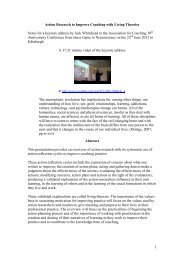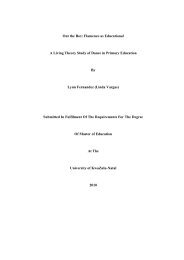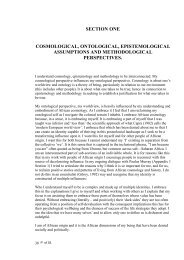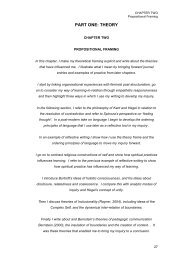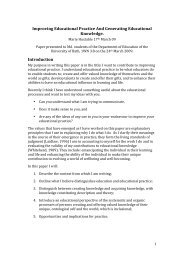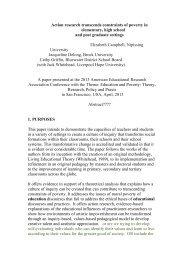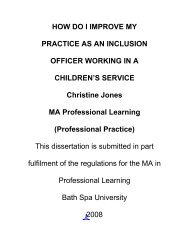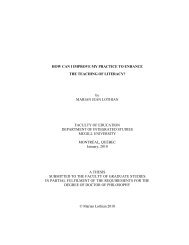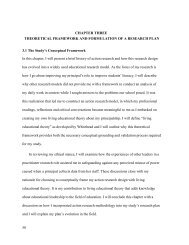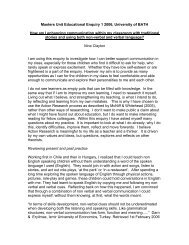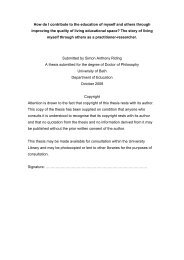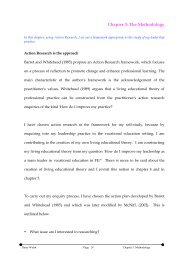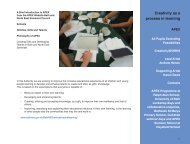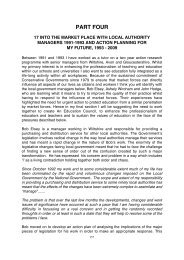- Page 1 and 2:
University of WolverhamptonTowardsa
- Page 3 and 4:
ContentsAbstract...................
- Page 5 and 6:
Chapter :5 Conclusions.............
- Page 7 and 8:
Figure 27: Ns in equal proportion .
- Page 9 and 10:
Glossary of AbbreviationsCommonly o
- Page 11 and 12:
career path. Such moments have been
- Page 13 and 14:
to teacher's professional learning,
- Page 15 and 16:
made 2 frontiers, traditional, ideo
- Page 17 and 18:
professional learning was shaped by
- Page 19 and 20:
“It [education] would seem to tak
- Page 21 and 22:
postdisciplinarity have not necessa
- Page 23 and 24:
ut with its roots as far back as Da
- Page 25 and 26:
“Who doesn’t spend time trying
- Page 27 and 28:
Chapter 2: Underpinning literatureT
- Page 29 and 30:
Rationale for selecting Epistemolog
- Page 31 and 32:
It is not the purpose of this study
- Page 33 and 34:
acquired inductively will argue tha
- Page 35 and 36:
lecture hall with an expert operato
- Page 37 and 38:
occurring in these moments is a shi
- Page 39 and 40:
2. Knowledge accumulated by profess
- Page 41 and 42:
(Goodson and Mangan, 1991) whether
- Page 43 and 44:
2.2.1 Historico-philosophical appro
- Page 45 and 46:
potentiality to change the circumst
- Page 47 and 48:
2.2.2 Buddhist approaches to the
- Page 49 and 50:
2.2.3 Scientific approaches to the
- Page 51 and 52:
eactions, or paying homage to share
- Page 53 and 54:
Green goes on to state that the rem
- Page 55 and 56:
2.2.4 Spiritual approaches to the
- Page 57 and 58:
oth soul and body in hell”) or to
- Page 59 and 60:
2.2.5 Post-modern approaches to the
- Page 61 and 62:
ehaviours that bring personal fulfi
- Page 63 and 64:
of the self. The notion of developm
- Page 65 and 66:
teacher selves in the phenomena of
- Page 67 and 68:
existence of an ‘alter ego’ for
- Page 69 and 70:
This model and theoretical perspect
- Page 71 and 72:
A contextualised approach to the ph
- Page 73 and 74:
2.2x: Relevant Insights derived fro
- Page 75 and 76:
may enable me to limit the number o
- Page 77 and 78:
It is important to read this diagra
- Page 79 and 80:
Freire (1972) would argue for the m
- Page 81 and 82:
Polsani's accidental intervention i
- Page 83 and 84:
y other adults including their pare
- Page 85 and 86:
2.3.0 Reframing the literature revi
- Page 87 and 88:
the sounds of Varese were 'mashed u
- Page 89 and 90:
2.3 Relevant Literature about (Info
- Page 91 and 92:
stables, the people who curried hor
- Page 93 and 94:
Examining texts written around the
- Page 95 and 96:
technologies, placed them. Most wou
- Page 97 and 98:
Lynch makes these observations in a
- Page 99 and 100:
Kirkpatrick (2010) verifies this hi
- Page 101 and 102:
Figure 8: Facebook image 2Noteworth
- Page 103 and 104:
Robinson's statement above is a nea
- Page 105 and 106:
there are an increasing number of l
- Page 107 and 108:
2.3.2: Accounts of the impact on pe
- Page 109 and 110:
This resonates with my experience o
- Page 111 and 112:
technologists who argue that the pu
- Page 113 and 114:
It was at a conference in Oxford th
- Page 115 and 116:
From the abstract to the directly r
- Page 117 and 118:
In essence it appears as if Halpin
- Page 119 and 120:
2.4: Liberation technology and prof
- Page 121 and 122: 2.5 Approaches to Professional Lear
- Page 123 and 124: correlation between the promulgatio
- Page 125 and 126: The key point to be made here is th
- Page 127 and 128: own knowledge'. Frequently now I wo
- Page 129 and 130: 2.6: Auto/pedagogyAn Emerging Frame
- Page 131 and 132: more established method to explore
- Page 133 and 134: Reflexivity and dialogicsIn keeping
- Page 135 and 136: ‘tomorrow’ might be designed fo
- Page 137 and 138: themes of the study and how it rela
- Page 139 and 140: From these words I take validation
- Page 141 and 142: experiencing, this might have been
- Page 143 and 144: In one sense, I have taken this thi
- Page 145 and 146: The intention is to take an approac
- Page 147 and 148: auto/biography. The term auto/biogr
- Page 149 and 150: would be necessarily noematic, but
- Page 151 and 152: As an RE specialist the use of stor
- Page 153 and 154: 3.1.4: Auto/biographyAutobiography
- Page 155 and 156: context/situation and action. These
- Page 157 and 158: The diagram in figure 15 has been d
- Page 159 and 160: exploitation prevalent in South Ame
- Page 161 and 162: integrate expertise to satisfy a no
- Page 163 and 164: advocated by Whitehead and McNiff (
- Page 165 and 166: Critically, the diagram points to t
- Page 167 and 168: A further reason why I settled on t
- Page 169 and 170: 3.1.7: Why ‘Illustrative Moments
- Page 171: 3.1.8: How will this auto/biographi
- Page 175 and 176: My first pass of each IM against th
- Page 177 and 178: 3.2: The relationship of my epistem
- Page 179 and 180: is represented here as the outcome
- Page 181 and 182: In this metaphorical presentation t
- Page 183 and 184: 3.3 A narrative account of the meth
- Page 185 and 186: eaders/audience to draw for themsel
- Page 187 and 188: The table above was constructed at
- Page 189 and 190: Chapter 4: An auto/biographic analy
- Page 191 and 192: vertical approach enunciated in cha
- Page 193 and 194: 4.1.1 Reflection on IM1Looking back
- Page 195 and 196: Evidencing this is impossible since
- Page 197 and 198: necessary and the resilience I have
- Page 199 and 200: It is a fact that I benefited from
- Page 201 and 202: than the cyclo-styled sheets we gav
- Page 203 and 204: platform as the basis for creating
- Page 205 and 206: 4.1.3 Reflection on IM3Professional
- Page 207 and 208: • Chinese education• Chinese te
- Page 209 and 210: ImpactThe impact on me of this trip
- Page 211 and 212: 4.1.4 Reflection on IM4Re-reading t
- Page 213 and 214: those articles that I reviewed, wro
- Page 215 and 216: As part of our initial contract wit
- Page 217 and 218: ContextAlluded to in 4.1.3 were the
- Page 219 and 220: Figure 23: Fullan's 3 I's of Educat
- Page 221 and 222: There are also 'bugs' in the domain
- Page 223 and 224:
from the concept of i n PD. That wa
- Page 225 and 226:
4.2: Stage 2: Analytical reviews of
- Page 227 and 228:
AnalysisOn completing the re-readin
- Page 229 and 230:
4.3.1: Analytical Reflection on IMs
- Page 231 and 232:
needed personal access to a compute
- Page 233 and 234:
there was a clear dialogic going on
- Page 235 and 236:
Looking back this was never more tr
- Page 237 and 238:
I did because my present employers
- Page 239 and 240:
4.3.2: Analytical Reflection on IMs
- Page 241 and 242:
installing software, connecting per
- Page 243 and 244:
Theoretically, the most helpful met
- Page 245 and 246:
locations and the pupil community b
- Page 247 and 248:
In 2005, I contributed a paper to t
- Page 249 and 250:
they participate: family, friends,
- Page 251 and 252:
Social networking utilities such as
- Page 253 and 254:
dynamism of networks and the inter-
- Page 255 and 256:
describe as auto/pedagogy, ‘new-n
- Page 257 and 258:
4.4: Stage 4 - Analysis by case stu
- Page 259 and 260:
gaining access to intellectual capi
- Page 261 and 262:
Of greater relevance for the thesis
- Page 263 and 264:
NetworkHad I only joined in with th
- Page 265 and 266:
4.5 Summative reflections to chapte
- Page 267 and 268:
It seems to me, that in my case, pr
- Page 269 and 270:
that they turned up in keyword sear
- Page 271 and 272:
5. A mixed-economy of pedagogical a
- Page 273 and 274:
eing the rigid structure that I dre
- Page 275 and 276:
take from my theorising about the p
- Page 277 and 278:
Alternatively, someone buying into
- Page 279 and 280:
professional learning episode and t
- Page 281 and 282:
The 'Zone' of Auto/PedagogyAt vario
- Page 283 and 284:
Where I differ in my approach from
- Page 285 and 286:
professional development context fa
- Page 287 and 288:
above. The problematic term here is
- Page 289 and 290:
that progress in personal, professi
- Page 291 and 292:
it would be linguistically tautolog
- Page 293 and 294:
have created, to scaffold my own se
- Page 295 and 296:
My point is that technology cannot,
- Page 297 and 298:
fill the gaps in their knowledge, s
- Page 299 and 300:
3) A new term, 'auto/pedagogy', whi
- Page 301 and 302:
Bly R. (1992) Iron John: A Book abo
- Page 303 and 304:
Foucault M. (1982) The Subject and
- Page 305 and 306:
Hughes S. (2003) N-Leaning Canterbu
- Page 307 and 308:
First accessed 26th September 2007M
- Page 309 and 310:
Plato (Trans Jowett B.) (2004) The
- Page 311 and 312:
Somekh B. (2007) Pedagogy and Learn
- Page 313 and 314:
Appendices313Simon Hughes Ph.D. The
- Page 315 and 316:
315Simon Hughes Ph.D. Thesis (Octob
- Page 317 and 318:
317Simon Hughes Ph.D. Thesis (Octob
- Page 319 and 320:
319Simon Hughes Ph.D. Thesis (Octob
- Page 321 and 322:
321Simon Hughes Ph.D. Thesis (Octob
- Page 323 and 324:
323Simon Hughes Ph.D. Thesis (Octob
- Page 325 and 326:
325Simon Hughes Ph.D. Thesis (Octob
- Page 327 and 328:
327Simon Hughes Ph.D. Thesis (Octob
- Page 329 and 330:
329Simon Hughes Ph.D. Thesis (Octob
- Page 331 and 332:
331Simon Hughes Ph.D. Thesis (Octob
- Page 333 and 334:
333Simon Hughes Ph.D. Thesis (Octob
- Page 335 and 336:
335Simon Hughes Ph.D. Thesis (Octob
- Page 337 and 338:
Appendix 2 - IM1 - 1989 (A@t 1 )Con
- Page 339 and 340:
‘cyclostyled’ resources. In a s
- Page 341 and 342:
“miracles” on screen, trying to
- Page 343 and 344:
My enthusiastic adoption of the tec
- Page 345 and 346:
Appendix 3 - IM2 - 1996-1998In Janu
- Page 347 and 348:
I now had access to the greatest li
- Page 349 and 350:
having a computer on my desk with a
- Page 351 and 352:
School when we had been given a New
- Page 353 and 354:
Centuries with so-called ‘Silicon
- Page 355 and 356:
cost-effective. The point here very
- Page 357 and 358:
Frustrated by the tardiness of the
- Page 359 and 360:
the value of participating in the p
- Page 361 and 362:
the now ubiquitous handheld, mobile
- Page 363 and 364:
and that the adoption of the signif
- Page 365:
Appendix 7 - A codification of N-ne



